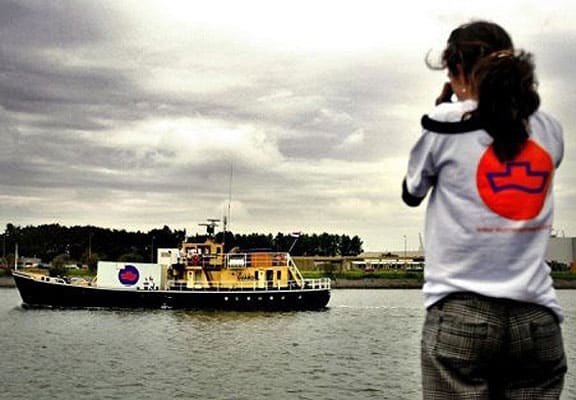
RABAT, Morocco (WOMENSENEWS)–An “abortion ship” was set to arrive in Smir today, its first time in a Muslim country, to kick off a campaign to promote safe medication for abortions in a country where hundreds of women are said to undergo an illegal form of the procedure daily.
The ship, and its related campaign, is being organized by the Dutch group Women on Waves and the Moroccan youth group Alternative Movement for Individual Freedoms (MALI). In response, Moroccan authorities closed down the harbor of Smir today to block the ship’s arrival, but the organizations said they are determining an alternative strategy for the ship to reach Morocco’s coastline.The ship was expected to stay for a week.
The ship will offer women, if any arrive and ask for help, early medical abortions through a drug, conducted on international waters. A hotline is also being launched to provide callers with information about safe medical abortions.
Women on Waves, who help with medical abortions rather than operations, is entering the Middle East and North Africa region, called MENA, for the first time, said Dr. Rebecca Gomperts, founder of the Dutch organization.
The group will be publicizing the availability of misoprostol, a drug that can be used to induce a safe abortion at home until the 12th week of pregnancy. It is available at Moroccan pharmacies under the brand name Artotec.
Gomperts said misoprostol is also available in other countries in the region, such as Algeria, Egypt and Libya. She hopes Morocco will act as a portal to help reach women in the rest of the region.
“The real goal is the information,” Gomperts said. “By doing a campaign in Morocco, it’s also kind of a signal and we hope we can help women in other MENA countries to get access to this information. There’s a big backlash to women’s rights [in the region] and abortion rights is one of the first lifesaving things for women that suffers.”
Public Debates Starting
Abortion is illegal in Morocco unless the mother’s life is at risk or the procedure is required to maintain her physical or mental health. There are no exceptions for rape or incest. While it’s unclear if the laws will change any time soon, Moroccans are starting to discuss a topic that is surrounded by taboo.
“The new minister of health talked about abortion in public,” said Mostafa Lamqaddam, Peace Corps’ health program manager in Rabat. “He said it’s a real problem and we need to look at the problem and see how to address it. He didn’t say we need to legalize it. The family minister, her idea is to not legalize it under any consideration. But at least there’s an open discussion about abortion now, the government is talking about something that’s a problem.”
Illegal abortions are considered widespread. There are no official statistics, but the Moroccan Association of the Fight Against Clandestine Abortion (AMLAC) reports between 600 and 800 are carried out daily. Of these, 500 to 600 are performed by doctors, which can cost anywhere from 2,000 to 10,000 dirhams (around $230 to $1,160), said Dr. Chafik Chraibi, president of the association. Between 150 and 200 of these abortions are non-medical, with women taking the cheaper route and visiting herbalists, midwives or trying to do it themselves, which can pose serious dangers.
“We receive complications in the hospital because of abortion…Sometimes each day, sometimes once a week,” said Chraibi, a gynecologist who is a department head at Maternite Des Orangers, a hospital in Rabat. “The women never say ‘I did an abortion,’ because it’s prohibited.”
Chraibi is one of the leading and most vocal proponents for legalizing abortion in Morocco and his association has been pushing to reform the law, in part to minimize the related health risks.
Based on the World Health Organization’s statistic that 13 percent of maternal mortality is caused by unsafe abortion, Women on Waves estimates that of the 687 women dying as a result of pregnancy every year in Morocco, 89 do so because of an illegal, unsafe abortion.
“Women, pharmacies, women’s organizations are not aware that the drug [Artotec] is there,” said Gomperts, the founder of Women on Waves. “It’s extremely important to know about it. It’s how women without financial means get safe abortions. They don’t have the means to go to a doctor who charges $400 for abortion. This drug is available for $10 in Morocco.”
Not the Majority
While Chraibi, Gomperts and groups like Alternative Movement for Individual Freedoms are advocating to improve access to safe abortion and to change the laws, many said they don’t represent the majority in Morocco.
Touria Harrizi, a midwife in Rabat with over 20 years of experience, said she and many other midwives oppose abortion.
“For us culturally if we establish [an abortion] law it will open the door for…more sex outside of marriage and prostitution,” she said. “I’m against abortion because we have preventative contraception. When you get pregnant, you need to take responsibility or otherwise there will only be more abortions.”
Abortion hasn’t been on the agenda for women’s groups here either, they don’t focus on it, said Latifa elBouhsini, a women’s rights activist in Rabat. Some in these organizations are also against abortion. “For feminists, their priorities are gender-based violence.”
Moroccan women’s rights groups have a complicated relationship with abortion, said Gomperts, in part because they are supported by the king and the government.
“Abortion is not an issue for women with means and these are the women who lead Morocco’s women’s organizations,” she added. “When a woman is not well educated, not part of the upper class, that’s when it’s a challenge. We want to bridge that gap. Access to safe abortion is fundamentally about social justice.”
Juhie Bhatia reported from Morocco on a fellowship from the International Reporting Project (IRP), an independent journalism program based in Washington, D.C. She’s the managing editor at Women’s eNews.

